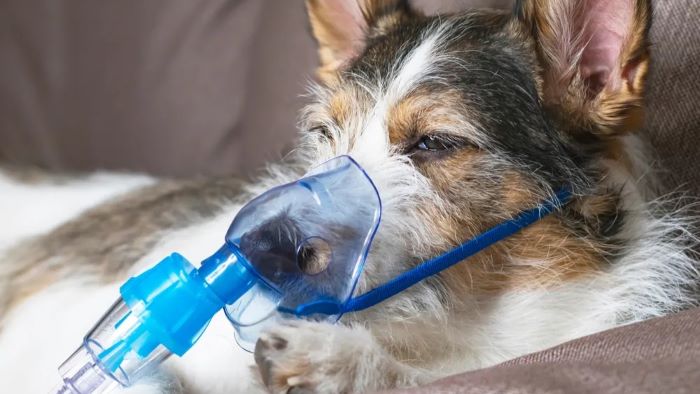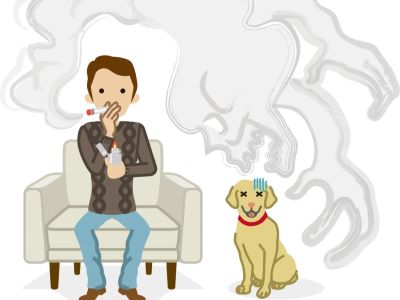Asthma is an irreversible condition which affects the respiratory system. Life with asthma is not easy, one has to deal with frequent attacks, coughing, sneezing and a lot. For a person suffering from asthma, their entire life is affected reducing the quality of their life. But have you ever wondered, “Can dogs have asthma?”
Here through our blog, we will provide you with all the required information, so that you can have proper knowledge regarding the same.

What Is Asthma?
Asthma also known as allergic bronchitis is a chronic condition. In this condition, the tubes called the airway carrying the air in and out during respiration are affected. As the effect of asthma, the airways get inflamed and narrowed with time.
The inflammation in the airway affects breathing leading to cough and difficulty in breathing. Asthma is an irreversible condition which cannot be cured. However, with proper treatment and care the symptoms cannot be managed.
Can Dogs Have Asthma?

Yes, dogs can develop asthma[1]. Although the chances of a dog developing asthma are less as compared to humans. Small-sized and middle-aged dogs are more likely to have asthma.
Like humans in dogs too asthma affects their airways causing inflammation and narrowing them. The symptoms of asthma in dogs may vary from moderate to severe depending upon its management.
As mentioned by Sarah Wooten, DVM in petmd,
“Dog asthma is defined as an allergic disease. Asthma attacks in dogs are caused by an allergic reaction that results in airway inflammation, which causes constriction and spasming of the small airways in the lungs.
When diagnosed in dogs, asthma is usually seen in middle-aged dogs and some young dogs. Typically, small dogs are more likely to have asthma than large dogs.”
Symptoms of Asthma in Dogs
Here are the symptoms of asthma in dogs:
- Cough: Due to asthma a dog may experience a dry cough for a prolonged period. If not treated the situation may worsen with time.
- Breathing difficulty: In asthma, the dog’s respiratory system is affected which enables the air inflow and outflow. This makes it difficult for the dog to breathe.
- Panting: As the lungs of a dog are affected creating hindrance in breathing, this leads to excessive panting.
- Pale gums: The lack of breathing in dogs reduces the oxygen level in the body causing the pale gums issue.
- Reduces activity: Excessive panting and difficulty in breathing all lead to reduced physical stimulation of the dog.
Causes of Asthma in Dogs

Asthma is a condition not caused by just any factor but there are several factors responsible for this:
Smoke
If your dog is frequently in contact with smoke then that smoke is inhaled by him in excessive quantity. This smoke further triggers allergic reactions in dogs causing asthma.
Dogs can even develop asthma from tobacco smoke. If you are a smoker then smoking tobacco near your dog can not only harm you but your dog too.
Fragrances
Not all fragrances are suitable for dogs. Some fragrances may affect the dog’s health due to the ingredients present in them. Certain perfumes, air fresheners or scented candle fragrances might trigger asthma in dogs.
Some of these fragrances are due to essential oils present in them. All essential oils are not friendly leading to asthma.
Pollen
Certain dogs are pollen-sensitive. Thus when they come in contact with pollens present in air, grass or weeds they develop pollen sensitivity. This sensitivity can become the cause of asthma in your dog.
When a dog inhales this allergen it reacts with their immune system and releases chemicals. This chemical inflames the dog’s airway resulting in asthma.
Other than this dogs can even develop asthma due to extreme physical stimulation, cold weather, stress, respiratory infection and an allergic reaction to certain medications.
How Is Asthma Diagnosed and Treated in Dogs?
Diagnosis of asthma in dogs:
Asthma in dogs is diagnosed upon examination by the vet. For the diagnosis vet can follow the following steps:
- A dog will start by knowing the medical history of the dog and the duration of the symptoms visible.
- Next, the vet will check the dog’s pulse and temperature.
- If the symptoms are more severe then the vet will further suggest a blood test, urine test and chest x-ray.
The test will help the vet in easy diagnosis of the dog’s condition and give him a clear picture of the dog’s health.

Treatment of asthma in dogs:
After the diagnosis, the vet upon analysing the dog’s condition will start the treatment accordingly. Here’s how the treatment will go:
- Asthma cannot be cured but it can surely be controlled by managing it properly. Reduction in inflammation will prevent frequent asthma attacks in your dog. For the reduction of this inflammation, the vet will prescribe some anti-inflammatory steroids.
- A vet may even prescribe bronchodilators to reduce the narrowness of the airway. This bronchodilator is supposed to be given either through injection or orally.
- Apart from this, the vet may prescribe antibiotics, antihistamines and other required medicines as per the severity of the condition.
- Throughout the treatment, the vet may ask you to keep your dog away from pollens and other triggers which can worsen the asthma in dogs. While the treatment will continue you may even need to prevent the stress and extreme mental stimulation in dogs.
Tips To Prevent Asthma in Dogs
Here are the ways to prevent asthma in dogs:
- Bath your dog frequently. Keeping your dog clean will help to keep the dirt, debris and other allergens away from stopping reducing the chances of asthma.
- Avoid smoking near your dog. The smoke of tobacco is not just harmful for humans but it is toxic to even the animals.
- Avoid scented candles and perfumes which can trigger asthma in your dog.
- Keep a close eye on your dog’s health. This will help you to notice even the slight change in your dog’s health and the fatal diseases can be prevented.
Natural Remedies for Dogs With Asthma

Here are the natural remedies for dogs with asthma:
Steam therapy
Steam therapy is one of the easiest home remedies you can perform for a dog suffering from asthma. Hot steam helps to open the dog’s airway tube, easing their breathing.
For the hot steam, give your dog a hot shower or you can even opt for a humidifier. If you are giving your dog a hot bath then make sure you dry him immediately or he can catch a cold.
Honey
Feeding your dog honey can be beneficial in easing the dry cough of your dog. Honey has anti-inflammatory properties which help in soothing the dog’s cough making it slightly easy to breathe. This helps to manage the asthma in dogs.
For a dog suffering from asthma, you can feed one teaspoon of honey twice a day.
Omega-3 fatty acids
Omega-3 fatty acids also have anti-inflammatory properties. This helps in reducing the symptoms of asthma to a great extent. You can either give your dog omega-3 through supplements or add it to their diet by providing food rich in omega-3.
Eucalyptus oil
Eucalyptus oil has decongestant properties, which relieve mucus congestion in dogs clearing the airway. Add a few drops of eucalyptus oil to your dog’s humidifier or hot steam. You can also apply a few drops of oil to the dog’s collar or their bedding.
Exercise
Regular exercise in moderation will help strengthen the dog’s respiratory health. This also helps in reducing the severity of asthma and the frequent attacks. While exercising dogs do not make them indulge in extreme exercise.
FAQs
Can dogs have asthma?
Yes, dogs can have asthma. Asthma is a condition which affects a dog’s respiratory system. This effect on the respiratory system leads to breathing difficulty, excessive coughing, sneezing and many other allergic reactions. Dog’s small in size and the middle ages one’s are more prone to developing asthma.
What can you give a dog for asthma?
Suppose your dog is suffering from asthma then before trying anything on your own consult a vet. A dog with asthma requires proper medical supplements to manage it. A vet may prescribe some steroids, bronchodilators and antibiotics, other than that you can give your dog oxygen therapy too.
Can humans get asthma from dogs?
No, humans cannot get asthma from dogs as it is a non-contagious condition. Even though asthma is not transmitted from dog to human, but can be surely triggered. For humans allergic to dogs asthma can be triggered if they are exposed to a dog’s saliva or urine.
How can I treat my dog’s asthma at home?
To treat your dog’s asthma at home you can try many things like feeding your honey once or twice a day to provide them relief from cough. You can also provide your dog with steam therapy which helps in opening their airway. Other than this you can try using eucalyptus oil and provide your dog with regular exercise.
What triggers dog asthma?
There are several factors that can trigger asthma in dogs like smoke. If your dog is inhaling smoke in an excessive amount on a regular basis then it can trigger asthma. Apart from that certain fragrances like perfumes, air fresheners or scented candles can lead to asthma in dogs. Certain pollens and dust mites too can cause asthma in dogs if are allergic.
Conclusion
Asthma not only affects humans but dogs too. Though it is not a common condition that affects dogs you need to be careful, especially with small and medium-aged dogs. If you notice any symptoms of asthma in your dog then consult a vet immediately. We hope that our blog, “Can Dogs Have Asthma?” helps you in everyway possible.
Asthma does affect dogs and their lifestyle but with proper care and medical help, it can surely be managed. Thus provide your dog with a healthy diet and proper exercise to keep him fit and healthy.
Reference:
- Chapman, R. W. (2008). Canine models of asthma and COPD. Pulmonary Pharmacology & Therapeutics, 21(5), 731–742.



